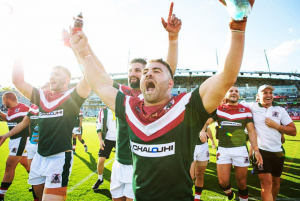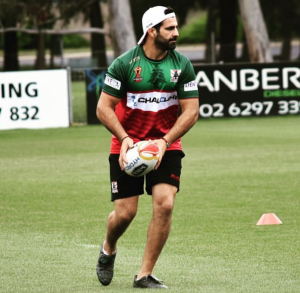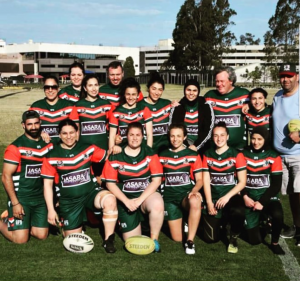Lebanon Cedars on the rise to Rugby League triumph
The Cedars created history after their impressive win over France at the Rugby League World Cup. Sports Gazette caught up with two of their players before they face England to discuss hyphenated lives, dual identities and the future of Lebanese rugby.
To the Lebanese people, the cedar tree found in the centre of the flag is a symbol of pride and patriotism. Almost a century ago, a seed was planted in Goulburn, New South Wales with the aspiration to maintain the Lebanese identity over 7,000 miles away from home.
Today this tree stands behind a group of remarkable individuals proudly representing their motherland. Amongst them are Andrew Kazzi and Nick Kassis, two Australian-born Lebanese Rugby League players basking in the glory of their latest win.
Like most youngsters, Andrew Kazzi started out playing football but admittedly fell in love with rugby from a very young age:
“My cousins were all playing rugby league and I was jealous of them, so I started crying and begging my parents to let me play with them, and it turned out for the better because I obviously was no Cristiano Ronaldo!” he fondly recalled.
The grounded and driven 22-year old spends his time juggling rugby league and his part-time job as a builder by trade.

He said: “It would be a dream come true if I can get a full-time contract, but for now I just have to focus on this World Cup and make sure I’m doing my job for the team.”
Similar to his fellow teammate, Nick Kassis works as an electrician when he’s not playing for the Parramatta Eels reserve team. And while Lebanon’s win last weekend might be taken at face value by some, it meant everything to this 28-year-old:
“I have been representing Lebanon for nearly 10 years now, and every game I have played contributed and came down to this very moment. Together we created history!” he explained.

Both players agree that this result is the biggest achievement in their sporting careers so far. But how can a small nation like Lebanon be so good at rugby?
There is a large Lebanese community in Australia due to previous wars back home and later immigration. The majority can be found in the suburbs of Sydney, where their next game against England will be played.
The success of the Cedars has been credited to the squad being based in Australia, and criticism has been aimed at their lack of home grown players. In fact, some of the players have never visited Lebanon, and if they have, it would only have been once a year. However, the connection that the players feel with Lebanon stems from being brought up in a home that is traditionally rich with a strong sense of cultural pride.
A player like Andrew Kazzi still identifies with his Lebanese roots despite never having set foot there. When I asked what he would call himself, the Cedar player did not hesitate to add a hyphen between his two nationalities:
“Australia welcomed and accepted my grandparents into the country when they left Lebanon because of the war, and gave them another opportunity at life. For that we are forever grateful and are proud to call ourselves Australian-Lebanese.”
And plans to visit his home country are on the horizon: “We are hoping to do a tour after the World Cup to Lebanon. I am excited to go back and visit my parents’ villages Damour and North Daraya.”
Nick Kassis, on the other hand, tries to visit Lebanon every year. He spoke passionately about how he loved the people, the lifestyle and the entertainment in the capital city Beirut.
He said: “With my team mate Chris Saab, we visit the people there to inspire the community to play rugby league. We teach the players and broaden their knowledge of the game.
“The people who are involved with rugby league in Lebanon are very passionate about the game. Some even know more of the players in the NRL [National Rugby League] than I do! Every time we go, they treat us like royalty and I appreciate that the most.”
Kazzi was equally amazed by the love and support the Cedars have received from the small nation: “It’s heart-warming. My extended family in Lebanon have been sending me messages and photos of people watching the game off a live stream, and just seeing that made me so much happier [about the win over France].
“It’s almost like they are more passionate about their rugby league than we are here in Australia. I’m sure they are still out partying in the streets with their drums!” he playfully added.
The game against France was televised in Lebanon, and even reached the attention of the country’s Prime Minister:
فوز جديد للبنان مع منتخبنا Rugby League في بطولة العالم.ننتظر المباراة القادمة بفارغ الصبر، قلوبنا معكم.كل الدعم والتقدير لمنتخبنا #RLWC2017
— Saad Hariri (@saadhariri) October 29, 2017
“A new win for Lebanon from our Rugby League team at the World Cup. We eagerly await the next game, our hearts with you. All support and appreciation for our team #RLWC2017,” Hariri tweeted in Arabic.
When asked about their thoughts on the upcoming fixture against England, both players agreed that it was going to be a tough game:
“It will be much more physical than the game against France. They are great across the whole park there. We just have to focus on getting the unforced errors out of our game.”
Kassis added: “But with the right training procedures and individual attitudes we can be very competitive.”
On a long-term basis, the Cedars are doing their part in shaping and inspiring their community to focus on rugby league, and eventually represent Lebanon. Kassis, in particular, has played an instrumental role:
“I have trained and been associated with the younger players, and also train the first Australian-based Lebanon Women’s national team.”

Similar efforts continue back home. He elaborated: “Robin Hachache and Wael Harb [ex-NRL players] have done a lot to help improve the game, and without them we wouldn’t have the quality of players coming from Lebanon. They have training processes and camps that help improve the skills of the Lebanon-based players.”
They have players from the home country flown in to Australia to shadow the national team too.
Andrew Kazzi also has high hopes for the future, as NRL stars like captain Robbie Farah, Tim Mannah, Mitchell Moses and Alex Twal have given the young Lebanese players role models to look up to.
He said: “After this World Cup campaign, it will just prove to the rest of the world that we are an emerging nation, which will put us on the map for bigger and better things to come for Lebanon Rugby League.”
Now that the seed has been planted for the generations to come, it is up to the rugby league players to make sure their Lebanese roots grow deeper and spread wider – bridging the two nations’ 7000-mile gap with a hyphen.
Feature photo credit: Brock Corfe
3 thoughts on “Lebanon Cedars on the rise to Rugby League triumph”
Comments are closed.
I have read so many articles regarding the blogger lovers except
this piece of writing is truly a pleasant piece of writing, keep it up.
Hi there! This is my first visit to your blog!
We are a group of volunteers and starting a new
project in a community in the same niche. Your blog provided us beneficial information to work
on. You have done a wonderful job!
Wonderful article! We will be linking to this particularly great post on our site.
Keep up the great writing.